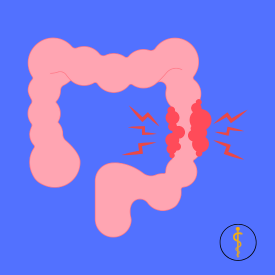Laparoscopic Colorectal Surgery

The colon, also known as the large intestine, is a crucial part of the digestive system. It is the lower section of the digestive tract and follows the small intestine. After food is digested in the stomach, it passes through the small intestine, where nutrients are absorbed. The leftover waste is then transported to the colon, where water is absorbed, and the waste is stored until it is ready to be expelled from the body through the rectum.
Laparoscopic colon resection is a minimally invasive surgical technique used to treat conditions affecting the colon. Unlike traditional open surgery, this method uses small incisions, allowing surgeons to operate with the help of a camera (laparoscope) and specialized tools. Typically, the procedure is performed through 4 or 5 small incisions, each about a quarter inch, providing surgeons a magnified view of the internal organs via a monitor. In some cases, one of the small incisions may be lengthened slightly to complete the surgery.
The benefits of laparoscopic colon resection include:
While laparoscopic colon resection has several benefits, it may not be suitable for all patients. Consult with Dr. Mohit Agrawal, an expert in laparoscopic surgery, along with your primary care physician to determine if you are a good candidate for this minimally invasive procedure.
Common diagnostic tests for colon conditions include a colonoscopy or a barium enema. A colonoscopy involves using a flexible tube to examine the entire large intestine, while a barium enema involves an X-ray after a special liquid is inserted into the rectum. Additional tests, such as a CT scan, may also be necessary.
Laparoscopic surgery involves the use of a small camera (laparoscope) inserted into the abdomen through a narrow tube. The abdomen is inflated with gas to give the surgeon more space to operate. The surgeon views the internal organs on a monitor and uses small instruments to remove the affected section of the colon. In some cases, one incision may be slightly enlarged to assist in completing the procedure.
In certain cases, the laparoscopic procedure may need to be converted to open surgery. Factors that may lead to this decision include:
Switching to open surgery is a decision based on patient safety and is not considered a complication.
After the procedure, it’s important to follow your doctor’s recovery plan:
Although rare, complications from laparoscopic colon resection may include:
Dr. Mohit Agrawal is dedicated to ensuring the safety and comfort of his patients through every step of the process, from initial consultation to recovery. If you have any questions or concerns about laparoscopic colorectal surgery, please don’t hesitate to reach out.
Laparoscopic colorectal surgery is a minimally invasive procedure used to treat conditions affecting the colon and rectum. It involves small incisions, a laparoscope (camera), and specialized instruments to perform surgeries like removing diseased tissue or repairing the bowel.
Common conditions treated include:
1) Colon cancer
2) Rectal cancer
3) Diverticulitis
4) Crohn’s disease
5) Ulcerative colitis
6) Colorectal polyps
7) Bowel obstruction
8) Rectal prolapse
Benefits include:
1) Smaller incisions and reduced scarring
2) Faster recovery and shorter hospital stays
3) Less postoperative pain
4) Lower risk of infections
5) Improved cosmetic outcomes
Under general anesthesia, the surgeon makes small incisions in the abdomen. A laparoscope provides a magnified view of the surgical site, and specialized tools are used to perform the procedure. Diseased parts of the colon or rectum are removed, and the healthy tissue is reconnected.
Candidates include patients with colorectal diseases that require surgical treatment and who do not have severe obesity, extensive prior abdominal surgeries, or conditions that make minimally invasive surgery challenging.
The surgery duration depends on the complexity of the case but typically ranges between 2-4 hours.
Most patients can resume light activities within 2-3 weeks and return to normal activities, including work, in 4-6 weeks. Full recovery may take up to 2-3 months, depending on the procedure.
A colostomy is required in certain cases, such as advanced colorectal cancer or severe infections. However, many laparoscopic colorectal surgeries allow for reconnection of the bowel, avoiding the need for a permanent colostomy.
While the procedure is generally safe, potential risks include:
1) Infection or bleeding
2) Injury to surrounding organs
3) Blood clots
4) Anastomotic leakage (leakage at the surgical connection)
5) Bowel obstruction
Yes, most health insurance policies cover laparoscopic colorectal surgery if it is deemed medically necessary. Check with your insurer for coverage details.
The cost varies based on the hospital, surgeon, and complexity of the case but generally ranges between ₹1,50,000 and ₹4,00,000.
Yes, most patients stay in the hospital for 3-7 days, depending on the complexity of the surgery and their recovery progress.
Initially, a liquid or soft diet is recommended. Gradually, patients can transition to a balanced diet with high-fiber foods to support bowel health. Follow your doctor’s dietary instructions for optimal recovery.
Yes, laparoscopic surgery is commonly used for colorectal cancer to remove tumors and nearby lymph nodes. It is effective in early-stage cancers and selected cases of advanced disease.
Mumbai offers access to highly skilled colorectal surgeons, state-of-the-art hospitals, and advanced technology for minimally invasive procedures. Additionally, treatment in Mumbai is cost-effective while maintaining international standards of care.
Preparation involves:
1) Completing pre-surgical tests (bloodwork, imaging, colonoscopy)
2) Fasting for a specified time before surgery
3) Taking bowel preparation medication as instructed
4) Discussing medications and health conditions with your doctor
Ready to take the next step towards expert and personalized care for Laparoscopic Colorectal Surgery?
Contact us today to schedule your consultation. Our experienced Laparoscopic Colorectal Surgery team is here to provide expert guidance and ensure your comfort throughout the process.